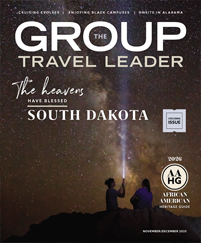 Courtesy Louisiana Dept. of Tourism
Courtesy Louisiana Dept. of Tourism
Call it green travel, ecotourism, sustainable travel or whatever else you like — the movement toward increased environmental and social consciousness in travel is continuing to grow, taking deeper roots in both the tourism industry and the minds of consumers.
By most accounts, green travel began to gain traction about five years ago, quickly growing in visibility through 2006 and 2007. Major transportation, lodging and tour companies began offering waste-reduction programs, buying sustainable food and supplies, and even setting up carbon-offset initiatives to help mitigate the environmental impact of their business operations.
Since the beginning of the recession in 2008, there have been fears that the sustainability movement in the travel industry would wane as companies fretted about a different kind of “green.” But experts today report that sustainable tourism continues to grow as businesses learn that cutting environmental impact can also help their bottom line and that consumers are beginning to show a measurable preference toward companies and brands that are environmentally responsible.
Today, destinations, industry associations and travel providers across the country have embraced sustainability and are working to encourage their peers to do the same.
“Triple bottom line”
With a wealth of expertise and a passion for spreading the word about 21st-century responsibility, Brian Mullis has become one of the leading voices for sustainability in the tourism industry. Mullis and his nonprofit organization, Sustainable Travel International, work with various industry groups to educate travel companies and consumers on the many facets of sustainability.
“The industry at large has viewed green travel as primarily addressing the environmental footprints associated with travel,” he said. “But that’s growing to a focus on economic, cultural heritage and environmental considerations. It’s a triple bottom line that more businesses are actively pursuing.”
The triple bottom line approach includes an emphasis on localized economic development, which helps residents of popular tourism destinations grow stronger communities. Similarly, an eye toward cultural heritage will help destinations maintain their unique local identities and avoid becoming overrun with homogenized touristy enterprises.
Although the recent weak economy may have hampered some people’s enthusiasm about green travel, Mullis said that new businesses continue to embrace the principles for both ethical and practical reasons.
“Some companies have cut expenses and backed off of their commitments somewhat,” he said. “Other companies have ramped up their efforts. We’ve seen more destinations looking at sustainable tourism as a solution for economic development to set their destination apart from others.
“All the research seems to indicate that people are aligning their purchasing power with their values. So destinations are realizing that they can derive a competitive advantage by being known as a green destination.”
The trend is catching on especially quickly in places like Costa Rica and Iceland, which are racing to become the world’s first carbon-neutral tourist destination in an informal contest dubbed the “carbon world cup.” In the United States, numerous state and local governments are offering incentives for sustainability, and Disney World is advertising free park admission to guests who do certain community work in their hometowns.
Mullis expects the growth in sustainable travel to continue as leading companies step up to set an example for the industry.
“It’s clearly here to stay, and I think the state of the economy will continue to impact companies’ decisions,” he said. “What’s interesting to me is that most of the multinationals in our industry, the industry leaders in each sector, are actively engaging in sustainability. Other competitors are realizing that they stand a chance to be left behind if they don’t get on board.”
Providing examples
The U.S. Travel Association (USTA) is one of the most powerful industry voices in the country, and as the organization’s chief researcher, Suzanne Cook has witnessed the growing popularity of sustainability.
“This is a topic that I have personally studied since the early 1990s,” Cook said. “It kind of faded away, and then in the mid-2000s, everyone got much more interested in it. We could see in consumer research that consumers were really starting to make decisions based on how sustainable or green preservation efforts were.”
Two years ago, in an effort to share sustainability information and best practices, USTA launched www.travelgreen.org, a business-facing website. Site users will find information and case studies from across all segments of the tourism industry demonstrating the positive effects of responsible practices.
“Our effort was to reach out to our members in the industry at large and show how important this is and how it’s part of the way that the industry should be doing business and to provide some good examples of how to do it,” Cook said. “The industry is primarily made from small businesses, and they need to learn from those that are a little bit ahead of them. That’s what we’re trying to provide to the whole industry.”
USTA hopes that by sharing examples with their members, they can help businesses better equip themselves to meet the growing demands of the traveling public. Although they don’t see consumers being willing to pay a higher price for sustainable brands, they do say that travelers are beginning to show a preference to green companies when prices are equal.
An economic recovery and a more-savvy constituency may help give the movement serious staying power, Cook says.
“Part of it is being driven by a consumer that is more educated about this,” she said. “I think we’re going to have growing interest, concern and attention to this issue. I think it’s here to stay, and that’s a good thing.”
Inspiration onboard
For Linblad Expeditions, journeys to exotic destinations and efforts to sustain those places have become an important part of the company brand.
“Conservation plays an important part of almost all of our core itineraries,” said Matthew Lachesnez-Heud, the company’s environmental manager. “For some guests, it’s an important part of who we are and what we do that drives their choosing us.”
Linblad operates small-ship cruises to such sensitive areas as Alaska, Costa Rica, Antarctica and the Galapagos Islands. Ten years ago, it began the Galapagos Conservation Fund, which has raised more than $4 million for environmental causes, protecting the islands’ rare flora and fauna.
The company’s work in the Galapagos also includes partnerships with local schools, recycling programs and other initiatives to help inspire travelers toward conservation.
“When someone is in the Galapagos and experiencing that place, they have a truer sense of why they should contribute to help preserve the place,” Lachesnez-Heude said. “So it’s the right time to convey the conservation needs, and it gives them an opportunity to have a positive impact on the place that they’re visiting.”
The company has implemented other environmental efforts across all of its cruises, such as a sustainable seafood program and advanced menu planning that help to minimize the waste and impact of onboard dining.
In 2008, the company introduced an ambitious Plan for Climate Action, which called for extensive financial dedication to carbon offsetting. The plan, unfortunately, hit a snag when the economy turned south but may resurface as things improve.
“Since the recession, we’ve backed off from our initial climate action plan,” Lachesnez-Heude said. “For many companies, the ambitions that they may have had have been put aside because of the economic downturn. But as we’re entering into a healthier place economically, we’re going to return to assessing what our climate impact is and how we can mitigate it.”
Statewide participation
Since 2007, the Wisconsin Department of Tourism has administered Travel Green Wisconsin, a program that certifies business across the tourism industry for environmentally responsible practices. In three years, it has seen an impressive amount of participation.
“It’s been a very positive response, but it wasn’t a surprise because Wisconsin has a long legacy of environmental stewardship,” said Lisa Marshall, the department’s public relations coordinator. “We have nearly 300 businesses certified. Those are accommodations, bed-and-breakfasts and even convention centers like Monona Terrace. We have restaurants, attractions, tour guides, boat tours and even the Lake Express Ferry between Milwaukee and Michigan.”
The certification process was developed by the Wisconsin Environmental Institute. Participating companies fill out a checklist detailing the steps that they are taking, such as recycling, reducing energy consumption and educating employees and visitors. The checklists are then reviewed by the environmental institute, and certification is awarded by the state.
“We’re looking for a commitment from the businesses to lessen their environmental footprint,” Marshall said. “You have to have a minimum of 30 points, but there are businesses that are well over that, into the hundreds. You’re not comparing to other groups; it’s about the things you’re doing that make sense for your business.”
One of the program’s highest scorers is the Pinehurst Inn in Bayfield, which makes its own fuel from waste items on site. Bayfield has more certified businesses than any other Wisconsin community and markets itself as a green destination.
For businesses in Bayfield and other communities, conservation and the recognition that comes with it can pay economic dividends.
“There’s a bottom-line benefit,” Marshall said. “When you’re saving money on energy and using less water, your expenses go down. And nationally, people are coming to expect it, and they want to patronize those businesses that are trying to be sustainable.”
Protecting assets
Stunning natural landscapes are perhaps the greatest asset for Hawaii, which relies heavily on tourism in its everyday economy. Because of this, the Big Island Visitors Bureau takes an active role in encouraging local businesses to protect the land and sea that are at the very heart of the visitor experience.
“We’re seeking out and encouraging all of our members to be responsible for our nature and the freshness of the land,” said George Applegate, the bureau’s executive director. “We’re encouraging them to create programs that will help us maintain that.”
One such initiative is Equal Adventure, a program to offer a more diverse selection of hiking trails through the tropical forest. By encouraging outfitters to take visitors to a wider variety of locations, the bureau can help reduce the environmental impact on the trails that are currently crowded with traffic.
Hawaii Forest and Trail, a leading ecotourism provider in the area, has started involving customers in conservation work firsthand.
“Part of the tour to Volcano National Park is to give them gloves and have them remove invasive species,” Applegate said. “The tour members are thrilled to feel like they’re participating.”
Another aspect of sustainability for the island is reducing dependence on outside foods and fuels, which must be shipped more than 2,500 miles to reach Hawaii. To accomplish this, several hotels and golf courses have begun switching to solar energy, and Kona International Airport now uses cold-water conversion for refrigeration and air conditioning.
A program called Island Fresh is encouraging greater cultivation of local food.
“It’s an effort by some farmers to help us become more sustainable and grow our own food,” Applegate said. “Right now, only about 15 percent of the food we consume here is grown in Hawaii. But people are starting to buy more local. It costs more, but it’s fresh, and we’re supporting our community.”
More Buyer’s Guide articles:
The new norm is constant change
Flexible group tours: You’re on your own
Gender-based tours: It’s understood
Green travel: Sustainable momentum
Group exclusives: Preferred customers
Researching travel: Do your homework










